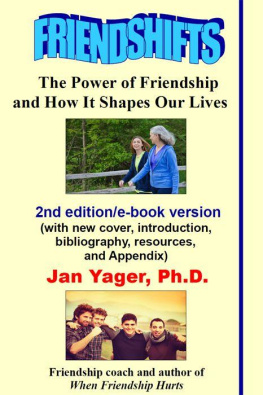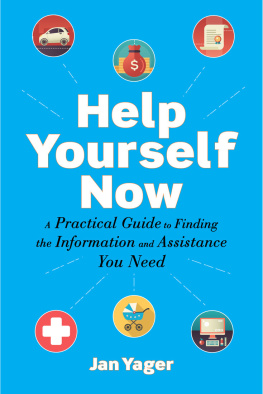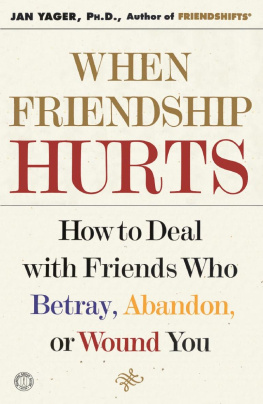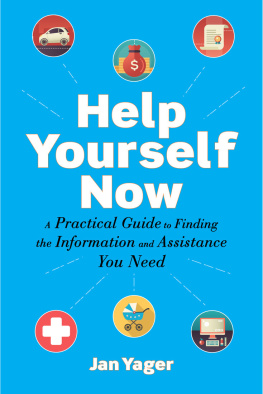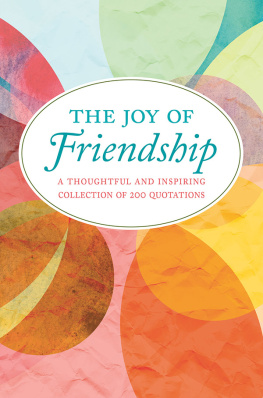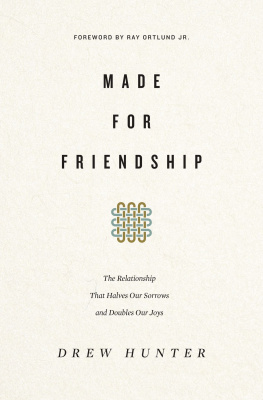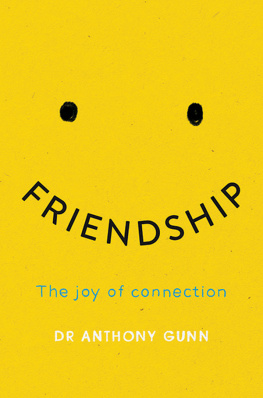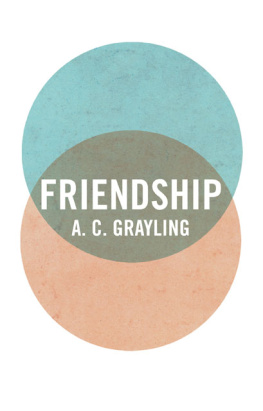FRIENDSHIFTS
The Power of Friendship and How it Shapes Our Lives
2nd edition (e-book version)
With a new introduction,
updated bibliography, resources,
and an Appendix
Jan Yager, Ph.D.
As featured on The View, the Today Show, CBS Sunday Morning, the Oprah Winfrey Show, CNN, The Early Show, and other major shows
Translated into 8 languages
"In these days of greater distance among people, many yearn for closer relationships. Too often, they don't know where to begin to asuage their loneliness. Simply and straightforwardly, Jan Yager shows them how."
--Harry Levinson, Ph.D., The Levinson Institute
"Rewarding, sensible self-help manual for making, keeping and improving friendships."--Publishers Weekly
Hannacroix Creek Books, Inc.
Stamford, Connecticut
For my husband, Fred, our sons, Scott and Jeff, with thanks for their continual appreciation of my friendship research, and our grandson Bradley; my sister Eileen, my extended family, devoted friends; and the memory of my mother, father, and brother
Copyright 2013, 1999, 1997 by Jan Yager, Ph.D.
All rights reserved. No part of this book may be reproduced or transmitted in any form or by any means, electronic or mechanical, including photocopying, recording, except for brief reviews, without written permission of the publisher.
Acknowledgment is made to reprint illustrations from B.C. by permission of Johnny Hart and Creators Syndicate, Inc. and by Tom Cheney, copyright 1997 by Tom Cheney, reprinted with his permission.
Authors Note and Disclaimer
The purpose of this book is to provide inspiration, information, and opinions on the topics covered. It is sold with the understanding that the publisher and author are not engaged in rendering psychological medical, sociological, or other professional services. The author and publisher shall have neither liability nor responsibility to any person or entity with regard to any loss or damage caused, or alleged to be caused, directly or indirectly by the opinions or information contained in this book.
Quotes in this book not attributed to a secondary source are from the original research conducted by the author, in the form of either interviews or questionnaires. If anonymity was requested, a fictitious first name has been provided; identifying details have also been changed to maintain that anonymity. However, care has been taken to preserve the integrity of each example. Typographical or content mistakes may be contained in this book. In addition, information may be out of date because it was unavailable until after the date of its completion, printing, or distribution.
Published by:
Hannacroix Creek Books, Inc., 1127 High Ridge Rd, #110, Stamford, CT 06905
e-ISBN: 978-1-938998-58-4 (Mobi) (2013)
e-ISBN: 978-1-938998-59-1 (ePub) (2013)
Publishers Cataloging In Publication (Provided by Quality Books, Inc.)
Yager, Jan, 1948
Friendshifts : the power of friendship and how
It shapes our lives / Jan Yager - 2nd ed.
p. com.
Includes bibliographical references and index.
ISBN: 1-88922-39-0 (hardcover) 978-1-889262-39-0
ISBN: 1-889262-29-3 (paperback) 978-1-889262-29-1
1. Friendship. 1. Title.
BJ575.F66Y34 1999 158.25
QBI96-546
Since this second edition of Friendshifts was published in 1999, Ive continued my research into friendship, publishing two books on friendshipWhen Friendship Hurts and 365 Daily Affirmations on Friendship and two books on work relationshipsWhos That Sitting at My Desk? and Productive Relationships.
What are the key developments in friendship since that time?
- Social media, especially Facebook, and its impact on friendship
- Using friendship skills to prevent bullying
- An increased acceptance that toxic friendships do occur
- Continued research and a growing awareness of the health benefits of friendship
- A blurring of the line between work and friendship
- A realization that aging presents unique friendship challenges
Lets look at those trends over the last decade.
The positive and negative impact of social media, especially Facebook, on keeping, and finding, friends
Whether youre on Facebook or not, with more than 1 billion members worldwide, Facebook is a phenomenon that cant be ignored. Chances are your friends are on it and you, or someone you know, may even have been unfriended. There are other sites that have friendship elements such as MySpace, Google+, LinkedIn, Twitter, Pinterest and foursquare.
Here are some questions you need to consider when deciding how engaging in social media is (or might) impact on your friendships:
- Are you spending more time communicating with your friends online and less time on the phone or getting together?
- Are you finding that you have dozens and even scores of casual friends or acquaintances (or even strangers) with whom you are communicating online and your close or best friends are starting to seem more estranged from you?
- Are you feeling more connected or lonelier since you became active on Facebook or other social media sites, like Twitter, LinkedIn, Google+, and others?
- Do you find youre making new friends, but those friends tend to be over the Internet and you dont get to meet in person very soon, if at all?
- Are you wondering if you should be using a different word than friend for the 500 or more friends that you are connected to through Facebook and other sites?
- Have you found Facebook or any of the other social media sites has dramatically hurt or helped one or more of your friendships?
In exploring the impact of social media on friendships, through e-mail communications as well as phone or in-person interviews, I have discovered that it is simply not an open and closed case of yes, social media is bad, or no, its helpful. There are many factors to consider and, using good judgment about what you post in your status update, is key.
For example, a friendship coaching client, a married woman in her early 40s with two young sons, shared with me that she was so upset with the way Facebook impacted on two of her friendships that she stopped visiting the site for almost a year although she eventually returned to it. What happened? In addition to some of her friends making negative comments about her husband that she found annoying, she was shocked when, on the same day, one friend and one relative posted as status updates about news that should have been handled in a more direct way especially when one friend posted that their mutual friend, a woman of just 39 with three children, had killed herself earlier that day. I wish people would pick up the phone, she said. Those personal events need to be shared that way still.
One of the principles about close or best friendship that still stands is that it is the exclusivity of information that is shared, as well as its timeliness, that can enhance or diminish the power of that relationship. Do this test on yourself to see if you agree: If you heard horrible or wonderful news, who is the first person you would call, e-mail or send a text message to? You will find that as you compose that list of who you would make those phone calls to, send those text messages or e-mails, you are basically revealing what your core network is.
But Facebook has a practical value; its faster and easier to share a post en masse with your network. Even if youve put together your Facebook network carefully, so it only consists of those you are truly connected to, when and what you post may still crucial. But timing counts even more if your network includes casual friends, or some business associates, acquaintances or even some strangers, since the timing of when you share, as well as what you share, becomes a much more delicate situation that you need to be aware of if you are to avoid hurting your friend or friends feelings.
Next page
